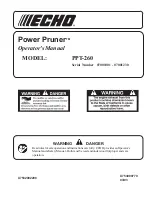
SKU 91852
For technical questions, please call 1-800-444-3353.
PAGE 6
13.
Causes and operator prevention of “kickback”:
Kickback is a sudden reaction
to a pinched, bound, or misaligned Saw Blade, causing an uncontrolled Saw to lift
up and out of the workpiece toward the operator. When the Saw Blade is pinched
or bound tightly by the kerf closing down, the Saw Blade stalls and the Motor
reaction drives the tool rapidly toward the operator. If the Saw Blade becomes
twisted or misaligned in the cut, the teeth at the back edge of the Saw Blade can
dig into the top surface of the workpiece, causing the Saw Blade to climb out
of the kerf and jump toward the operator.
Kickback is a result of tool misuse
and/or incorrect operating procedures or conditions and can be minimized
by taking proper precautions as given below:
A. Maintain a firm grip with both hands on the Saw, and position your body
and arm to allow you to resist kickback forces.
B. When the Saw Blade is binding, or when interrupting a cut for any rea-
son, release the Power Switch and hold the Saw motionless in the work-
piece until the Saw Blade comes to a complete stop.
Never attempt to
remove the Saw from the workpiece or pull the Saw backward while the Saw
Blade is in motion or kickback can occur.
C. When restarting the Saw in the workpiece, center the Saw Blade in the
kerf and check that the saw teeth are not engaged into the workpiece.
If
the Saw Blade is binding, it may walk up or kickback from the workpiece as
the Saw is restarted.
D. Support large panels to minimize the risk of Saw Blade pinching and
kickback.
Large panels tend to sag under their own weight. Supports must
be placed under the panel on both sides, near the line of cut and near the
edge of the panel.
E. Do not use a dull or damaged Saw Blade.
Unsharpened or improperly
set Saw Blades produce a narrow kerf causing excessive friction, Saw Blade
binding and kickback.
F. Make sure all Saw adjustments are tight and secure before making a cut.
If Saw adjustments shift while cutting, it may cause binding and kickback.
14.
WARNING! The Lock Pin (128) should always be activated in the
“locked down” position when the Saw is not being used and when the Saw
is being transported. The Lock Pin should be activated in the “locked up”
position when changing Saw Blades. NEVER use the Lock Pin in any cut-
ting operation.
The Lock Pin allows the operator to lock the Saw Blade in
position, preventing the Saw Blade from being raised or lowered.
15.
Allow the Saw Blade to spin up to full speed before feeding it into the work-
piece.
Do not force the Saw Blade into the workpiece when cutting. Apply
moderate pressure, allowing the Saw Blade to cut without being forced. When
turning off the Saw, allow the Saw Blade to spin down and stop on its own. Do
not press against the Saw Blade to stop it.







































